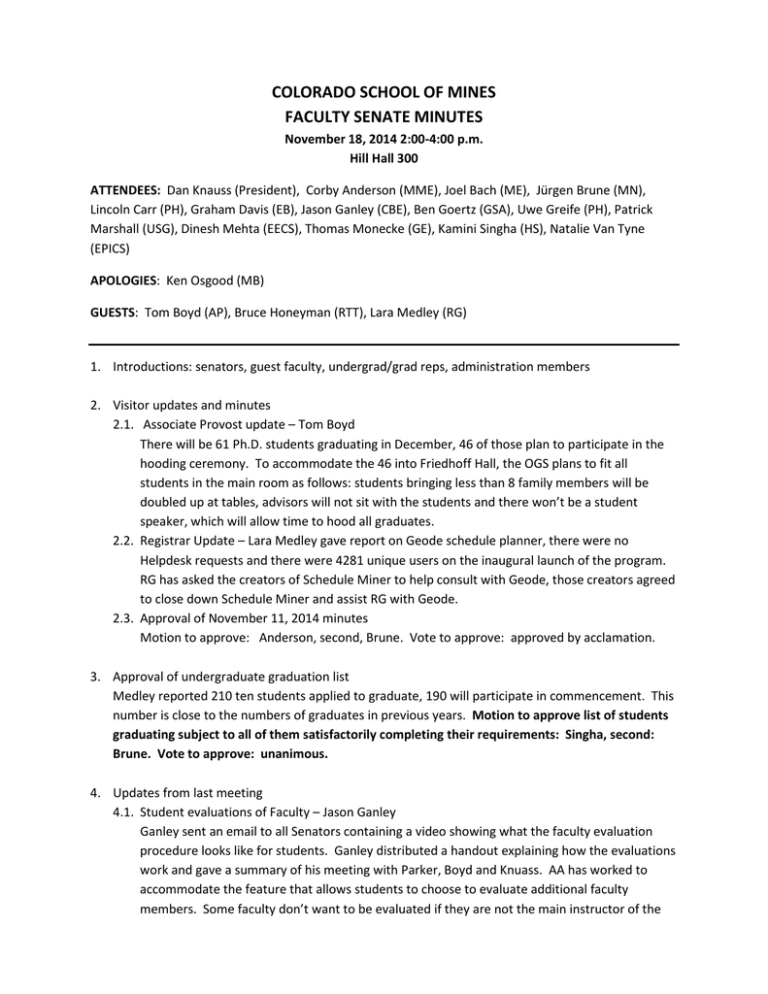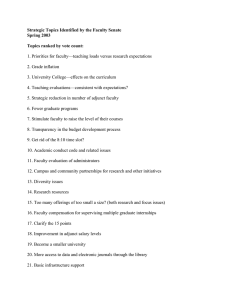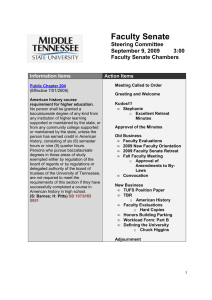COLORADO SCHOOL OF MINES FACULTY SENATE MINUTES
advertisement

COLORADO SCHOOL OF MINES FACULTY SENATE MINUTES November 18, 2014 2:00-4:00 p.m. Hill Hall 300 ATTENDEES: Dan Knauss (President), Corby Anderson (MME), Joel Bach (ME), Jürgen Brune (MN), Lincoln Carr (PH), Graham Davis (EB), Jason Ganley (CBE), Ben Goertz (GSA), Uwe Greife (PH), Patrick Marshall (USG), Dinesh Mehta (EECS), Thomas Monecke (GE), Kamini Singha (HS), Natalie Van Tyne (EPICS) APOLOGIES: Ken Osgood (MB) GUESTS: Tom Boyd (AP), Bruce Honeyman (RTT), Lara Medley (RG) 1. Introductions: senators, guest faculty, undergrad/grad reps, administration members 2. Visitor updates and minutes 2.1. Associate Provost update – Tom Boyd There will be 61 Ph.D. students graduating in December, 46 of those plan to participate in the hooding ceremony. To accommodate the 46 into Friedhoff Hall, the OGS plans to fit all students in the main room as follows: students bringing less than 8 family members will be doubled up at tables, advisors will not sit with the students and there won’t be a student speaker, which will allow time to hood all graduates. 2.2. Registrar Update – Lara Medley gave report on Geode schedule planner, there were no Helpdesk requests and there were 4281 unique users on the inaugural launch of the program. RG has asked the creators of Schedule Miner to help consult with Geode, those creators agreed to close down Schedule Miner and assist RG with Geode. 2.3. Approval of November 11, 2014 minutes Motion to approve: Anderson, second, Brune. Vote to approve: approved by acclamation. 3. Approval of undergraduate graduation list Medley reported 210 ten students applied to graduate, 190 will participate in commencement. This number is close to the numbers of graduates in previous years. Motion to approve list of students graduating subject to all of them satisfactorily completing their requirements: Singha, second: Brune. Vote to approve: unanimous. 4. Updates from last meeting 4.1. Student evaluations of Faculty – Jason Ganley Ganley sent an email to all Senators containing a video showing what the faculty evaluation procedure looks like for students. Ganley distributed a handout explaining how the evaluations work and gave a summary of his meeting with Parker, Boyd and Knuass. AA has worked to accommodate the feature that allows students to choose to evaluate additional faculty members. Some faculty don’t want to be evaluated if they are not the main instructor of the Page 2 section. Last semester faculty could see which students completed an evaluation, this has been fixed and this semester faculty cannot determine which students have completed evaluations and which have not. Faculty who know the ins and outs of Blackboard are able to delete or add students to their class for evaluation purposes, however, AA is working to prevent that. There was criticism of the timing of giving the evaluations. AA reminded Ganley and Knauss that it was possible for any of these problems to take place with the paper evaluations (pulling out student’s forms, adding extra student forms). It was also noted, that even though the evaluations are distributed electronically the same time as the paper forms were in the past, with the paper forms, faculty had control of exactly when they were handed to students. Faculty do not have that control with the electronic evaluations. Ganley explained that students who drop a course after Census Day are dropped from the electronic evaluations. Students who drop a course before Census day cannot be deleted from the evaluation e-mails, however, AA is looking into how to make this change. There is an option for adding customized questions for faculty who want to ask their own questions, rather than or in addition to, the current 11 questions. Customizing evaluations is not currently available, but may be an option in the future. Knauss noted that the request for electronic mid-term evaluations was driven by students, whereas this is driven by AA. The administration wants electronic data which is more efficient and easier to work with. Ganley said some issues have been fixed, but most have not. Students have received new instruction that they are not to do the evaluations in the comfort of their homes, but they are to do them in ten minutes in class on their mobile device. Knauss said faculty do not want to take class time for students to complete evaluations. He was surprised that this option was not taken out of the instructions. Carr noted, this has turned out to be different than what we were told in the presentation by the woman who came here two years ago. Anderson commented on the usefulness of doing evaluations in class, now that students receive several e-mails reminding them to complete the evaluations, they may be annoyed and not willing take the time to do them. Monecke asked about the implications for young faculty who have a poor response rate from students. Davis reported in 2005/06 his student evaluation of faculty committee worked many hours, pilot tested forms between the old questions and the new questions and performed an analysis of the responses. His committee was careful in the survey design and the group soundly rejected going electronic because other institutions had bad results. Knauss noted, this is the only measure of an instructor’s success and if the Senate wants to design a system where faculty evaluate their peers and also start a mentoring system, we can work toward that. Davis noted that these are “Student Evaluations of Faculty” and not “Faculty Evaluations.” A group of teaching faculty, through the Undergrad Council, are working on evaluation ideas to correct this system. Discussion ensued about next steps. Knauss suggested Senate generate a memo to AA identifying all of the concerns that were discussed, Senators agreed. Response rate last year was 60%. Knauss noted that Kay Schneider should be involved and that she should look at the electronic evaluations to see whether the data is accurate. Davis suggested the Senate write a letter to the University P&T Committee to alert them that the Senate Page 3 suspects the data last spring may be bad. Senate can send the same letter to Department Heads prior to annual evaluations expressing Senate concern with the data. Davis will draft a memo to AA, based on the findings of his previous committee work and current feedback from faculty; Knauss will help finish the memo. Senators agreed to this plan. Moneke suggested faculty receive this memo as well, so they know how evaluations work. 4.2. Campus Climate meetings with administration – Dan Knauss There is a meeting set up this Thursday for Senate Executive Committee to meet with Parker, Boyd, Department Heads and Deans. This meeting resulted from the ombuds discussion. All Senators are welcome to attend. 5. Faculty Trustee election - Joel Bach Bach sent an e-mail to all faculty inviting them to express an interest in running for the Faculty Trustee position. One response has been received, Bach expects more interest. Two thirds of the faculty need to vote to satisfy the Handbook requirements. If there is not a majority for any one candidate then there will need to be a runoff. 6. Committee assignments – Joel Bach The Readmission Committee needs a Faculty Senate representative. The next meeting is December 5 and Monecke, the current representative, needs a substitute. Davis volunteered to attend the meeting in December. Additional meetings are January 5 and 6, March 5 and May 1. Between the two, Monecke and Davis will cover those meetings. Bach met with Parker last week to discuss committees. All University Committees are staffed and updated on the AA website. Parker and Bach had a discussion about committee structure and how to manage the ad hoc committees. Bach brought up the fact that a few of the faculty do all of the work and mentioned that one idea is to ask the Deans to ensure their faculty members perform their share of the service load. 7. Campus committees and regular responsibilities 7.1. Undergrad council – Jason Ganley A third pilot for CHGN198 was approved. There was not a vote on approving it to serve as a substitute for CHGN122. Mining Engineering tracks were approved, this is an information item for Senate sent out via the new CIM system. 7.2. Grad council – Jürgen Brune On November 5, Noelle Vance, from the Mountain Language Institute (MLI) gave presentation about their English language instruction. CSM is working with MLI, it is not clear if there is funding for the language courses. Council approved several new course changes. Jeff King put forward a proposal to tighen up rules around research credits so that students do not circumvent their advisors for PRU grades. If faculty members fail to put in grades, it causes a mess for students and RG. The rationale for pre-entering all research credits with PRG is that if faculty are unhappy with a student, they will remember to change grade to a PRU. Knauss felt that the students should have to get approval to move advisors, but did not like changing f grades. Senate liked the requirement of getting advisor approval. Page 4 7.3. Research council – Uwe Greife Council meets Thursday, nothing new to report. 7.4. Faculty Handbook Committee – Graham Davis Committee meets tomorrow, nothing new to report. 7.5. Calendar Committee – Jürgen Brune Next meeting scheduled for beginning of December. There was some concern among Senators that the e-mail that went out from Lara Medley was biased, stating more of the cons rather than the pros of recognizing MLK Day. 7.6. Brief report on any other committees Greife reported the Budget Committee meets next week. Greife reported the Parking Committee met last week. There is enough parking for the next couple of years. When the new Meyer Hall is built, the plan is to turn 15th Street from Arapahoe to Illinois into a pedestrian plaza, which will result in the loss of 63 parking spaces. The small “L” lot will disappear also. Also, it was reported at Parking Committee that people with reserved parking are not filling up the reserved lots because they are not always on campus. The reserved lots are sold out, but often look partially empty. Greife reported, in a couple of years, the school may try to build a parking structure. Singha asked about getting eco passes for faculty. 23 minutes. Five minute break at 3:00 pm (ish) 8. Major topics of discussion 8.1. Discussion of Search for next President Members of the search committee for the next CSM President will be announced today. There will be seven faculty members, from all colleges and all levels, two BOT members, two from Foundation, two from administration (Kirsten Volpi and Kevin Moore), two from Student Life (Derek Morgan and Jerry Miller - student trustee), and two from the classified staff (Kristi Gitkind and Susie Potter) as well as Mike Dougherty. Spaanstra from the BOT is the search committee chair. Singha reported that confidentiality within the search is important. Now is the time for CSM faculty to call up high-quality faculty and Provosts from other schools and encourage them to apply for the position. Knauss reported that the BOT is looking for a President who is academically inclined, unlike Scoggins who has a PhD but no academic experience. Senate needs to let BOT know they want academic experience. Search committee will get resumes, narrow it down to 10 or 12, and then hold off-campus interviews with the candidates. They will narrow it down to one candidate and by Colorado statute the candidate will be announced to campus and given a two-week waiting period. After a two week waiting period, the selected candidate will be officially hired. Singha told a board member that there needs to be communication outward to explain why parts of the search process need to be confidential. Knauss encouraged people to attend the meetings with the search committee. Page 5 8.2. Shared governance – Thomas Monecke, Jürgen Brune – Not discussed. 8.3. Senate response to procedures manual changes – Not discussed. 8.4. Regarding Senate recommendations from last year – Not discussed. 9. Senate schedule for remainder of semester Next meeting November 25, 2-4 pm, Hill Hall 300 (or off campus)

